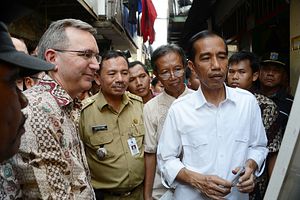The opposition Indonesian Democratic Party of Struggle, known as the PDI-P, has emerged as the frontrunner in legislative elections, confirming its candidate Joko Widodo, popularly known as Jokowi, as favorite to become the nation’s next president.
After a quick count in the April 9 poll the PDI-P, Indonesia’s largest opposition party, had secured almost 20 percent of the vote in the 12-party race. The result was a clear improvement on the 14 percent it won five years ago but fell short of the 27 percent of the overall vote it had targeted.
Widodo has been a clear leader in opinion polling for the last 12-months and has provided the PDI-P and its chairman, former president Megawati Sukarnoputri, with its best chance of success in 15 years.
The party has not enjoyed an electoral victory since 1999 and he accepted its presidential nomination in mid-March telling supporters “in the name of God I am ready.”
To secure a presidential nomination, Widodo must win 25 percent of the overall vote or 20 percent of the 560 seats in the House of Representatives.
Among the other contenders Aburizal Bakrie of the Golkar Party was running second with almost 14 percent of the vote, followed Prabowo Subianto with about 12 percent.
President Susilo Bambang Yudhoyono—who has said many were skeptical about Widodo’s ability to lead the Muslim-dominated nation of 247 million people—must step down in October after completing his two-term limit.
The surprise in this election, however, were the Islamic parties, which had been suffering in the court of public opinion from a spate of corruption scandals. They grabbed a combined 32 percent of the vote after predictions they would fare much worse than the 29 percent they won in 2009.
The Jakarta Globe said the win for Widodo was not as convincing as many had predicted after “the Islamic parties, against all odds, maintained a strong presence on the country’s political landscape.”
“One reason cited by analysts for Joko’s popularity failing to help the PDI-P to the extent that was predicted, is that a large portion of voters who support Joko, do not feel the same way about the PDI-P. As the PDI-P failed to grab 25 percent of the vote, nor 20 percent of legislative seats, the party has not met the presidential threshold,” it said.
This means the PDI-P could be forced to choose a coalition partner for July’s presidential poll.
One analyst, who declined to be named, said this was also a poor reflection on Megawati, who served as president from 2001 to 2004 and is the daughter of Indonesia’s first and iron-fisted president Sukarno.
“Jokowi’s position seems solid in the aftermath of this election and when compared with the other candidates but the party might have to do some serious politicking between now and the July elections,” he said.
A Roy Morgan International opinion poll found support for Widodo had climbed to 45 percent, up from 35 percent following his presidential nomination. Subianto, a former general, and Bakrie, ranked 30th on the country’s rich list by Forbes Magazine, were well behind with 15 percent and 11 percent respectively.
A one-time furniture exporter, a former small town mayor of his hometown Solo and currently governor of Jakarta, Widodo has earned comparisons with U.S. President Barack Obama for his relative inexperience and his ability to capture and hold the national attention through social media and an anti-corruption platform.
More that 186 million people are expected to vote in July.
Luke Hunt can be followed on Twitter @lukeanthonyhunt

































